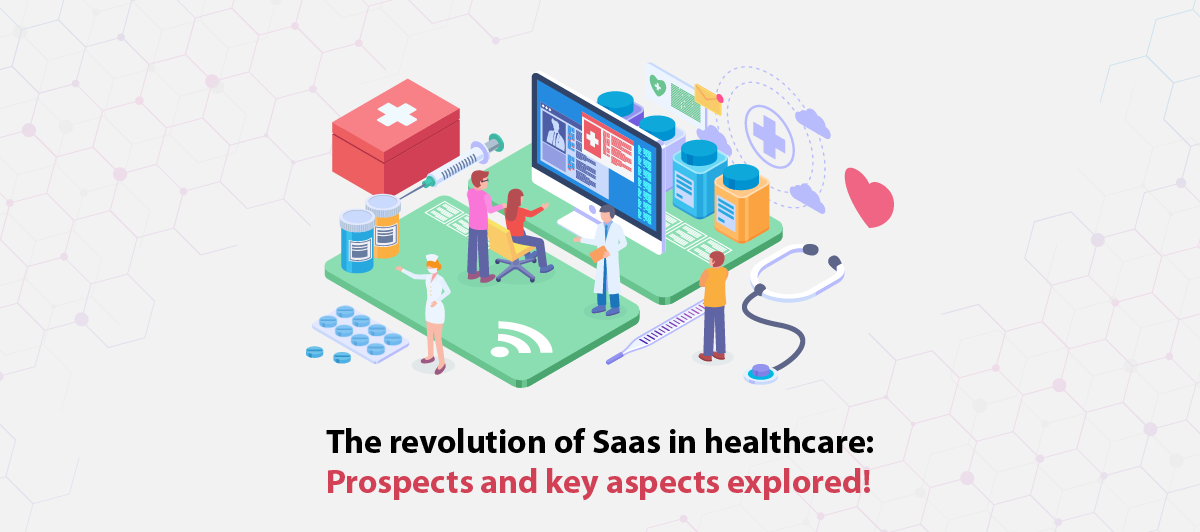The Rise of Saas in Healthcare: Exploring Prospects and Key Aspects in 2024
Quick Summary: Explore the use of SaaS in healthcare through our informative blog. Discover how it enhances workflows, improves patient care and shapes the future of the industry. Read this blog to explore the benefits and potential of SaaS in transforming healthcare.
Introduction
The adoption of big data, Cloud computing and mobile technologies has significantly transformed how healthcare industries work. Healthcare is generally an expensive industry to operate.
There is a great deal of responsibility on the part of people in these sectors to ensure the well-being of their staff and patients. The company is always searching for ways to increase productivity and operational efficiency without spending too much money.
But why is saas important in Healthcare?
The use of SaaS-based solutions helps healthcare sectors improve the economics of their services.
In 2026, the global healthcare cloud computing market is expected to reach $76.8 billion.
A wide range of SaaS solutions is available for healthcare, depending on the target audience and business type. Healthcare management, user experience, compliance and data security are some critical functional aspects of a healthcare saas company.
Read on to find out more about the use of SaaS in healthcare. Let’s get started!!!!!!!!
What Is A Saas Application?
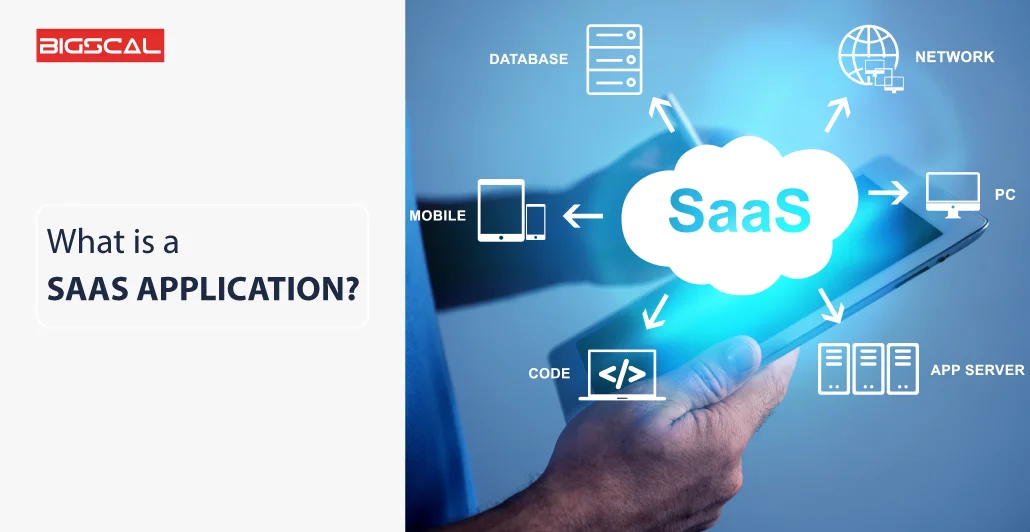
Software-as-a-service (SaaS) application is a type of software that is accessed and used over the internet. You can use the software through a web browser instead of installing it on your computer. It’s like renting software; you don’t have to worry about maintenance or updates because the provider takes care of them. You can also Outsourcing Health Software.
Furthermore, external cloud providers such as AWS and Azure manage these cloud infrastructures and data warehouses. Additionally, you can produce a scalable and reliable product by developing SaaS applications correctly.
What is Healthcare SaaS?
The concept of software as a service in healthcare is familiar since you have already studied it. Let’s learn more about healthcare SaaS applications. The availability of healthcare SaaS applications is global are creating Healthcare Digital Transformation.
Electronic medical records (EMRs), electronic health records (EHRs), telehealth, and picture archiving and communication systems (PACSs) are some SaaS services examples. Several nonclinical information systems are also available, including RCM, billing, and supply chains.
Growth scale of 2022–2023 for SaaS in healthcare
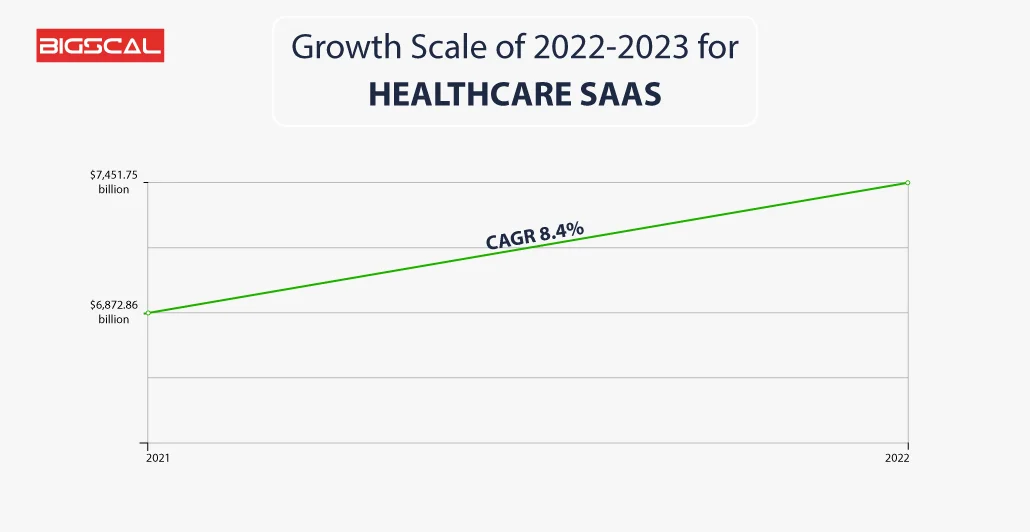
The global healthcare market is predicted to grow significantly soon. As the market grows at 8.4% CAGR, it is expected to reach $7,451.75 billion in 2022 from $6,872.86 billion in 2021. Similar to how SaaS products are becoming more popular than other strategies in the software business.
Software as a service (SaaS) is expected to grow 27.5% by 2028 from USD 130.69 billion in 2021.
These statistics indicate that SaaS applications are becoming more popular in healthcare. The benefits of cost-effectiveness, security, and scalability made them particularly attractive.
Benefits Of Saas In Healthcare
Let’s check out the benefits of Leading Healthcare software as a service application:
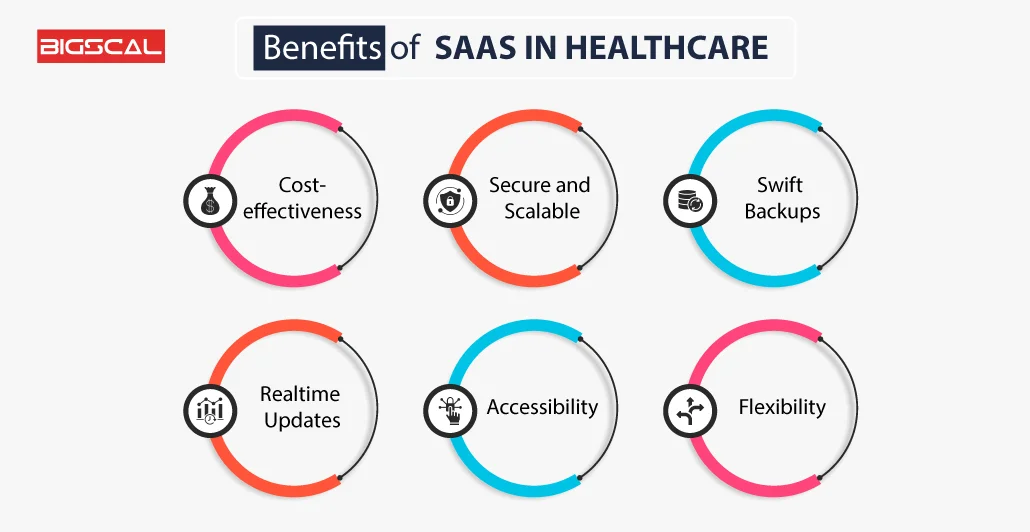
1. Cost-effectiveness
Healthcare Saas product companies leverage highly expensive technologies to build many sensitive features. Furthermore, healthcare tech companies never compromise advanced functionality in the application, just to save budget!!!.
However, SaaS provides an economical solution to healthcare industries. They don’t need to spend on:
- Operation cost
- Maintenance cost
- Configuration cost
- Unwanted expenses
Additionally, it is possible to change SaaS, which makes it an ideal choice for healthcare where data plays an important role & eliminating any unanticipated circumstance is essential.
2. Secure and Scalable
SaaS apps provide various security features allowing hospitals or medical firms to protect patient data.
Furthermore, it also provides various security compliances and regulations, such as HIPAA, to safeguard sensitive information and health records.
Additionally, SaaS applications are highly scalable as they are cloud-based. Medical providers don’t need to worry about scalability, as they can quickly scale the size of the apps according to business needs.
3. Swift Backups
One of the most significant benefits of SaaS application development services is backups, which are simple and quick to perform. In SaaS applications, the backup of data and file occur continuously. As a result, it is easy to recover all the medical data and records in an emergency.
4. Realtime Updates
Software as a service in healthcare provides real-time modifications, enabling medical firms to ensure their data is always up-to-date.
Furthermore, this enables all the healthcare professionals working on a patient’s care to share work and regular updates on data. Additionally, it enables healthcare experts to get updated with the most recent information that helps them to give excellent patient care. Even you can find that optical character recognition (OCR) saas technology could be very beneficial for this, as it enables health practitioners to extract and copy text from important medical images and documents. Such extraction of text from health related files can be easily facilitated with image text extractor without any huge human intervention.
5. Accessibility
With SaaS applications, authorized users can access information from any geographical location and at their convenient time. It is imperative because doctors can consult with each other about patients from afar. Additionally, doctors and patients can communicate more easily.
6. Flexibility
It is the goal of the SaaS healthcare company to provide patients with quality care based on their needs. SaaS allows applications to be configured for different populations and geographies.
Top Trends Of Saas In Healthcare
Let’s take a glimpse at various trends in SaaS healthcare tech companies:
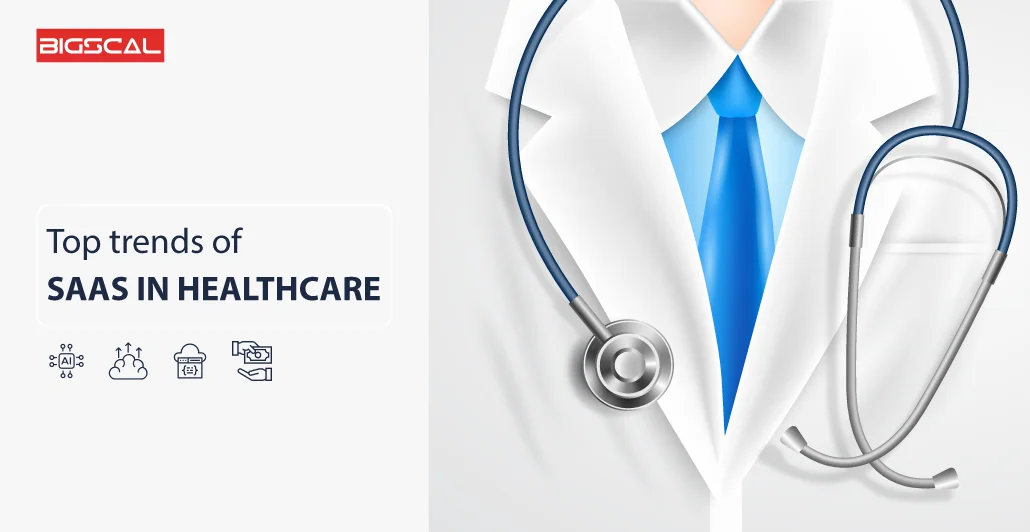
1. Artificial Intelligence (AI) Services
SaaS application development companies automate operations by using artificial intelligence (AI), which helps business to boost their performance and efficiency.
Furthermore, artificial intelligence automates the SaaS healthcare industry in various ways.
It helps in finding security issues, identifies patterns to detect potential threats and has self-recovery features to retrieve important data.
Also, it helps keep sensitive information safe and makes operations more reliable and productive.
Additionally, Artificial intelligence simplifies and automates the discharge process. Health First created AI-driven analytics to expedite the discharge procedure of patients in Central Florida, cutting the length of time they stay in the hospital by six hours on average.
2. Multiple Cloud Strategy
According to experts, there is a 19.6% increase in the number of businesses using cloud software. The multi-cloud solutions ability and new healthcare SaaS trends help medical institutions fix challenging problems.
With a multi-cloud strategy, SaaS companies can run their apps in the same location as their customers. Healthcare providers can reduce the high costs of interregional bandwidth with the cloud solution.
Furthermore, employing multiple cloud providers allows medical firms to empower their capabilities to handle, organize and analyze healthcare data. A robust health cloud data model can significantly enhance these capabilities by providing a structured framework for storing, managing, and retrieving patient information, medical records, and other relevant healthcare data
Additionally, the cloud service provider offers various disaster recovery options. They also provide easy-to-use subscription-based management services for businesses to efficiently handle their recovery process.
3. Vertical SaaS
Vertical SaaS is a popular trend where software applications cater to specific industries like healthcare. It’s more commonly used than horizontal SaaS, which applies to various sectors.
Furthermore, Vertical SaaS specializes in a particular industry, offering tailored solutions for supply chain and customer care.
It addresses specific challenges and incorporates industry expertise to meet the unique requirement of organizations in that sector.
Vertical SaaS solutions are gaining popularity in the B2B market due to their customised nature. Examples include retail analytics, logistics analytics and healthcare BI software.
Additionally, specialization provides more affordable benefits because they can be customized.
4. Pay-per-use model
SaaS serves as a unique subscription model in the healthcare industry. As a result, users are only charged a set amount per month or year.
The pay-per-use model, however, offers new options for organizations seeking temporary staff.
Since it does not charge enough subscription fees on a monthly or yearly basis, it’s a very popular choice for startups or new healthcare sectors.
What Do Saas Healthcare Companies Do?
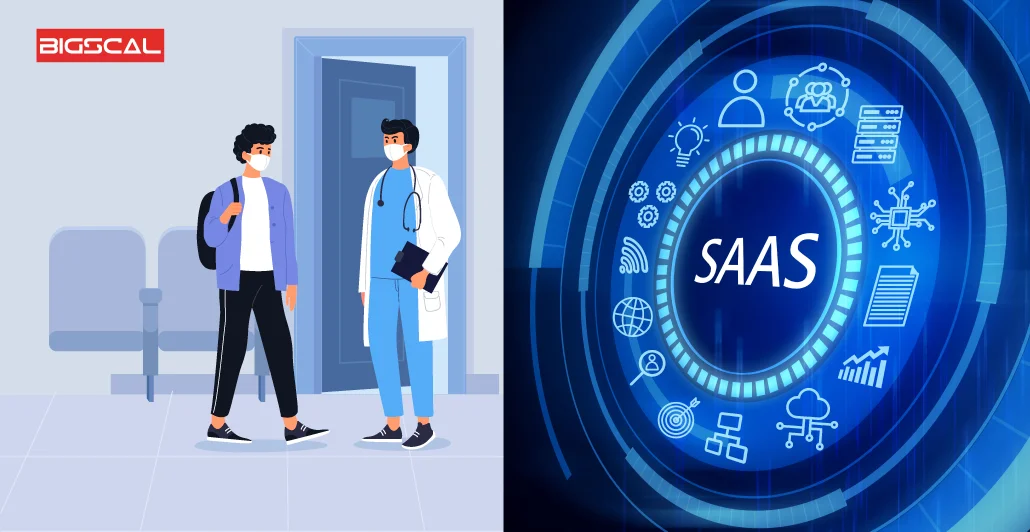
Within the next few years, the healthcare cloud computing market is expected to reach approximately $65 billion.
The strong determination of medical firms to adopt advanced technologies to improve the quality of the healthcare sector is the prime reason behind the growing popularity of SaaS in the healthcare market.
Nowadays, SaaS in healthcare provides cloud-based business management solutions that help firms to manage appointments, client information, classes, online bookings, inventory management, payroll etc.
Additionally, a few companies provide regulatory management, quality management, clinical management, and many more solutions through SaaS applications.
How To Build A Saas Healthcare Application?
Below we highlighted six steps for building a healthcare SaaS application. Let’s discuss it in detail.
Step 1: Planning
It is essential to have a clear vision of what the SaaS Application will present to the healthcare industry before searching for SaaS Application development companies. SaaS Applications’ vision for the market will be presented to end users.
Furthermore, to make the application user-friendly and problem-solving, plan its features and functionalities precisely.
Additionally, you can define your SaaS application’s architecture and functionalities more specifically by deciding who will use it.
Step 2: Analyzation
Firstly, start contacting the SaaS applications development company, once you finalized your plan.
Furthermore, these companies will help you list the best features and functionalities and prepare a plan accordingly.
They will demonstrate the plans to keep the application simple to use, use a cloud-based server, authorize access, and secure errors.
Step 3: Finalize the documentation
The next step is to check and approve your documentation before executing the development process. Furthermore, It is crucial to confirm all the aspects honestly and legally. Documents include user specification, scope, company contracts, HIPAA compliance, and BAA.
Step 4: Design MVP
The initial plan of your application will be based on MVP(Minimum Viable Product) design. Furthermore, companies will only approve and proceed to development if the MVP of the SaaS application is feasible.
Step 5: Development Process
Once you have finalized the plan, documentation and tech stack, you can initiate the development process.
Furthermore, building a SaaS requires a lot of knowledge and expertise especially for constructing applications in the healthcare industry, because it is equipped with highly confidential data.
To get the best development support, you should hire developers from the consulting firm you have been working with so far. Let’s move to the last step of SaaS application development.
Step 6: Deployment and Maintenance
SaaS application development companies put huge efforts into delivering full-featured and high-quality applications.
Furthermore, SaaS companies check the quality of the product, and its code and conduct tests before launching it in the market.
Also, companies provide excellent maintenance support to keep your SaaS applications free from bugs and updated.
How Does Bigscal Help You To Build A Healthcare Saas Application?
If you want to build an efficient SaaS healthcare app, it’s important to consider a variety of factors, such as how your customers will interact with your app, the design of end-to-end processes, and overall business needs.
It’s always better to partner with top-notch healthcare SaaS companies in India and the US. Bigscal has proven experience in developing SaaS applications and our team can help you throughout the development process.
We can help you in creating customized healthcare applications by choosing the right technology stack.
Hire healthcare software developers from bigscal to construct enticing SaaS applications. Get in touch with our dedicated SaaS application developers to build your project!!!!!!!!!!
Conclusion
We hope that you have learned how to build SaaS healthcare applications from this blog. Also, we have discussed several surrounding topics. SaaS applications play a significant role in the healthcare industry and provide immense benefits for medical cures and hospital operations. In addition, the healthcare industry is experiencing some positive trends.
FAQ
What is SaaS in healthcare?
In the healthcare industry, SaaS application development provides doctors, hospital staff, and patients with fast, finer, and more cost-effective services.
What is the difference between a saas healthcare application and a web application?
SaaS applications aim to connect diverse systems and devices by creating a platform or a system. Using healthcare applications in this way can support patient care and improve patient experience. With SaaS solutions, users can solve more complex problems. A faster development cycle is also provided, as well as scalability and flexibility.
Why use SaaS in healthcare?
There are many advantages to using SaaS in healthcare. Enhance operations, increase efficiency, and establish a secure intranet.
How to choose a dedicated SaaS application development company?
Your next step is to research and find SaaS app development companies that can work on your project. Make a shortlist of viable choices by checking through the review websites, analyzing the websites of development firms, etc.
How much does it cost to build a SaaS healthcare application?
The cost to build a SaaS healthcare application varies greatly depending on factors such as complexity, features, development time and the expertise of the development time. It can range from thousand to millions of dollars.
